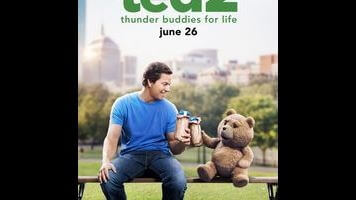It’s a funny thing to say about a movie with a foul-mouthed, pot-smoking teddy bear, but there actually were signs of a maturing sensibility in Ted, MacFarlane’s first foray into big-screen comedy. The film boasted plenty of the writer-director’s famous (infamous?) cutaways, those one-joke non sequiturs that remain Family Guy’s raison d’etre. But Ted also proved how much his particular comedic style benefits from the demands and limitations of live-action storytelling; if you’re going to ask audiences to stay planted for two hours instead of 22 minutes, you have to give them a little more to cling to than random acts of cruelty and pop-culture allusions. Ted 2, MacFarlane’s third feature after the (somewhat unfairly) maligned Western spoof A Million Ways To Die In The West, is less toxic than his small-screen work. Yet without the Apatovian arc of its predecessor, it also feels a bit like a regression—especially given its typical sequel strategy of undoing the hard work of the previous film.
One of the best gags in the first Ted was how everyone just kind of accepted the existence of the title character, a toy brought to life through the power of a child’s wish. (A couple decades after earning worldwide headlines, he was basically treated like a washed-up celebrity.) The sequel flips that gag on its ear; after trying to adopt a child with his new wife Tami-Lynn (Jessica Barth), Ted finds his very personhood called into question, the government attempting to revoke his basic liberties by reclassifying him as property. That’s right: The creator of Family Guy and American Dad has made a crude civil-rights parable, complete with fiery courtroom speeches about what it means to be human. Not that MacFarlane’s newfound enlightenment conflicts much with his affinity for racial humor; there are passing references to Frederick Douglass, Roots, sickle-cell anemia, Tyler Perry movies, and—in the film’s most persistent running gag—the unavoidability of black penises on the internet. Is the civil-rights angle only there to balance out the barrage of black jokes? Or are the jokes a way for MacFarlane to prove that he hasn’t lost his edge?
Either way, Ted 2 strikes a sometimes-awkward balance between sincerity and cheap provocation. It also forgets that the real draw of the first film wasn’t Ted himself, but Wahlberg, whose sweet-lug routine scored a lot of belly laughs. The actor has less to do this time around. His character is now divorced, and it’s a genuine bummer to see MacFarlane treat his ex—wonderfully played by Mila Kunis in the original, nowhere to be seen in the sequel—like a wet blanket who brought him down, instead of the catalyst for a positive life change. The love interest slot has been filled by Amanda Seyfried, cast here as Ted’s wide-eyed pothead lawyer. She’s a down-for-whatever dream girl straight out of the Farrelly brothers’ wheelhouse—though given her pop-culture illiteracy, probably not really MacFarlane’s type. (He sets an entire sequence at the New York Comic Con, the ideal backdrop for a writer whose work often hinges on colliding one reference with another.)
The comedy, as expected, is scattershot. There are lame cameos, like a one-shot appearance by Jay Leno, but also inspired ones, like a priceless exchange with Liam Neeson. And while an early Breakfast Club spoof is lazy even by MacFarlane standards, a Jurassic Park parody plays smarter tribute to Spielberg’s blockbuster than anything in Jurassic World. An avowed musical-theater devotee, the director also finds room for a little song and dance: The Busby Berkeley-inspired opening credits are basically a live-action remake of Family Guy’s title sequence, and MacFarlane later stops the movie cold with a time-suck of an acoustic lullaby. Whether this smattering of shtick has the desired effect will depend on one’s tolerance for jizz jokes, celebrity namedrops, and frequently desperate attempts to shock or offend. But even the target demographic may feel as though they’re watching a rerun, especially once Giovanni Ribisi shows up to act out his same villainous scheme from Ted. There’s nothing like an inevitable sequel to put a growth spurt in reverse.








































